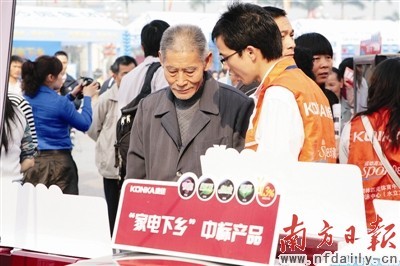 The Ministry of Commerce website recently released the sales data for home appliances to the countryside in August. In August, it sold 6.96 million units of products and realized sales of 18.66 billion yuan, which was significantly lower than the figure for July, and the stimulating effect of home appliances to the countryside was waning.
The Ministry of Commerce website recently released the sales data for home appliances to the countryside in August. In August, it sold 6.96 million units of products and realized sales of 18.66 billion yuan, which was significantly lower than the figure for July, and the stimulating effect of home appliances to the countryside was waning.
According to data from the Ministry of Commerce, in the first eight months of this year, sales of home appliances to the countryside were 65.41 million units, and sales were 163.2 billion yuan, up 41.3% and 61.9% year-on-year respectively. As of August 2011, the country’s total sales of home appliances to rural areas totaled 180 million units, achieving sales of 405 billion yuan and issuing subsidies of 46 billion yuan.
Although the overall performance is still relatively good, compared to 7.17 million units of home appliances sold in rural areas in July, compared with sales of 19.97 billion yuan, August sales of 6.96 million units and sales of 18.66 billion yuan, respectively. It fell by 7.32% and 6.56%. In addition, compared with the same period of last year, the sales data for August also decreased by 1.3%, while in July it was a year-on-year increase of 11.8%.
It is an indisputable fact that the growth in sales of home appliances is weak. Prior to this, data from Ovid Consulting showed that in the first half of the year, the domestic retail market sold 19.37 million sets of color TV sets, completed 46.3% of the full-year forecast, and sales were 73.66 billion yuan, down by 0.6% and 2.3% year-on-year respectively, which was significantly lower than the market before. A 10% increase is expected. Recent data from the National Information Center also showed that sales and sales growth of domestic washing machines in the first half of the year have both declined significantly. In addition, in the first half of this year, sales growth of washing machines in the first-tier cities basically stagnated, with an increase of only 3.73%.
At the same time, the stimulating effect of a series of state subsidy policies is declining. This point is reflected not only in the sales data of home appliances to the countryside, but also in the past, the old trade policy has shown a weak trend. Compared with the data in June, July’s air-conditioning sales There is no significant growth that has driven the trade-in.
According to the implementation plan originally set by the State Council, the home appliances to the countryside policy for the first batch of pilot regions in Shandong, Henan, Sichuan, and Qingdao will expire in November this year, and other regions will also expire in November 2012. However, the government has not yet reached a final conclusion on when the policy will be withdrawn, but home appliance manufacturers generally believe that the negative impact of the policy launch will not be too great. TDL Group Chairman Li Dongsheng believes that the state subsidy policy is the same for all market players. Therefore, the impact on market share will not be very direct. Galanz Group spokesman Lu Yulie believes that as the urbanization process continues to increase, the expanding new consumer groups will provide a broad market space for business development.
At present, home appliance companies have already begun to promote channel sinking. During the implementation of the home appliances to the countryside policy, it also opened the door for enterprises to reach the 3rd and 4th level markets. Many domestic brands have made breakthroughs in the construction of the 3rd and 4th markets circulation channels and after-sales service outlets. In the market, it can be foreseen that the next three or four markets will repeat the brutal battles in the primary and secondary markets, and will face a new round of industry reshuffle.